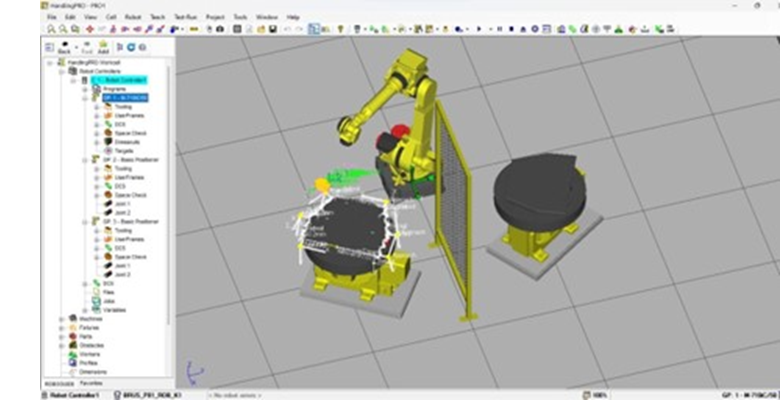General details
EDIHs involved
Challenges
Jakles Dvor d.o.o produces wood products that are very different from each other and have specific shapes. These are various semi-finished round and oval shapes with several different combinations of openings and cut-outs. The finishing process involves sanding and polishing, which is very physically demanding and time-consuming. All the work was done by hand, which was very difficult because of the high precision required. In order to modernize its production processes, the company decided to introduce a robotic sanding and polishing line. The robotic line consists of a Fanuc robot with two additional rotary tables and a FerRobotics grinding multifunctional end-of-arm-tool. The robot can perform grinding operations with high precision and high repeatability, without any variation in quality. The initial expectations for the robotic line were a faster and more consistent final grinding and polishing of the products and a significant reduction in manual work. After the installation of the robotic line was completed, the problem of the actual grinding of complex shapes arose, because each product needs its own specific grinding process.
Programming the robotic grinding and polishing trajectories on the robot was very time-consuming and require a lot of testing and correction, and consequently costly. To solve this problem, the company sought SRC-EDIH's help to find a solution for them as part of the EDIH project.
Solutions
 The solution to the problem was to create a digital twin of their robot line and perform a computer simulation of the most optimal robot trajectories that can be converted into actual robot programmes.
The solution to the problem was to create a digital twin of their robot line and perform a computer simulation of the most optimal robot trajectories that can be converted into actual robot programmes.
A copy of the robot program has been loaded into the RoboGuide simulation software. In this way, a digital form of the robot is transferred into the virtual environment, which is identical in all settings and properties to the real robot. A digital model of the product was also entered into the computer programme in the form of a CAD file. This way, we get a virtual environment of the robot and the product in which we can recreate working operations identical to the real ones.
All the testing and trials were carried out in this way in a virtual environment, which was much easier and faster than manual programming on the robot line. One robot trajectory was produced on the computer in 4 hours, instead of 5 days on the actual line.
The rationale behind the private investments are Increased Production Efficiency, Improved Product Quality, Faster Innovation, Increased Adaptability, Reduced Long-Term Costs.
Results and Benefits
By using a digital twin and a robot line simulation, all the robot programs for the different wood products were developed and verified in a virtual simulation environment.
The company received accurate data before programming even started. In this way, the creation of the robot programs and their optimisation was much faster and easier.
The RoboGuide computer program allows the creation of a genuine robot program in a graphical interface, which can be transferred directly to the corresponding robot and is immediately usable to control the robot.
Programming the robots did not require production to be stopped, and thus did not disrupt the production process itself and there was no downtime in manufacturing.
Perceived social/economic impact
Digital twins in robotics are a revolutionary tool that allows companies to improve their production processes and increase their competitiveness. Using digital twins, companies can simulate and optimise robot trajectories, leading to significant time and cost savings as complex set-ups can be tested and validated in a virtual environment before being implemented in the real world. This technology also enables better understanding and control of production processes, which can help to increase efficiency, speed up product development and improve quality. In addition, digital twins contribute to greater flexibility in production by allowing faster adaptation to changes in the market and customer needs.
Social impacts include improved working conditions as the need for time-consuming manual programming is reduced, which can also reduce the potential for errors and improve safety in the workplace.
Economic impacts can be seen in productivity gains and reductions in long-term costs, which can lead to increased private investment and stimulate innovation across the industry.
DMA score and results - Stage 0
The overall DMA score is 33.
The key weaknesses identified are in Data Governance and Green Digitalisation, with scores of 14 and 0, respectively.
The strengths lie in Digital Business Strategy - with score 67, Human-Centric Digitalisation - with score 54, and Digital Readiness - with score 39.
Automation & Artificial Intelligence scored 24, indicating room for improvement.
Lessons learned
-
It is important that the information obtained is as accurate as possible about the actual situation and the objectives of the company itself.
-
The work must be continuous and concise, without prolonged interruptions.
-
Ongoing communication with the company is important to ensure that the work does not go in the wrong direction.
-
The client should be encouraged to take the time to cooperate and coordinate on an ongoing basis.
-
Positive communication and demystification of digitalisation is important in order to dispel the fear of companies, and small entrepreneurs in particular, of modern technologies.
Need support?
Consult our catalogue to locate the Eupopean Digital Innovation Hub nearest to you and accelerate your company's digital transformation.

